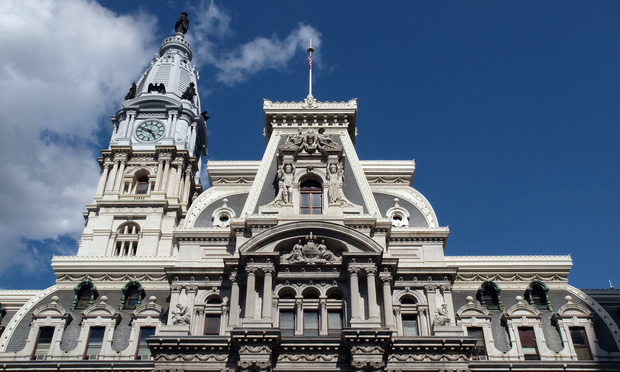Constitutional Challenge to Pa.'s Death Penalty, Discipline for Ex-Penn State GC Baldwin Highlight SCOPA Session
The justices are scheduled to hear arguments in a total of 17 cases during its three-day oral argument session, which is set to begin Tuesday in Philadelphia.
September 04, 2019 at 03:18 PM
6 minute read
 Philadelphia City Hall. Photo: Shutterstock
Philadelphia City Hall. Photo: Shutterstock
Closely watched cases, including a challenge to Pennsylvania's death penalty and the disciplinary proceedings against Penn State's former general counsel Cynthia Baldwin, are set to kick off the state Supreme Court's fall session.
The justices are scheduled to hear arguments in a total of 17 cases during its three-day oral argument session, which is set to begin Tuesday in Philadelphia. Along with the death penalty challenge and disciplinary proceedings, the seven-member court is expected to hear argument on a range of topics, including the availability of unemployment benefits for Uber drivers and whether the rule of capture applies to fracking.
Death Penalty
The second day of the September session is scheduled to begin with a focus on the high-profile challenge to the state's death penalty.
The justices are set to hear argument in the consolidated appeals of Cox v. Commonwealth and Marinelli v. Commonwealth starting at 9:30 a.m. Wednesday. The case comes before the justices in an unusual posture, as the justices agreed to hear the case under their extraordinary King's Bench jurisdiction.
However, a possibly more unusual feature is the fact that the Philadelphia District Attorney's Office, which is prosecuting the case, is in agreement with the defendant that the death penalty statute is unconstitutional as applied. The prosecutor's brief, entered in July, garnered significant media attention as it marked what one court observer called an "unprecedented" move of having a prosecutor's office pushing to have a death-penalty statute struck down.
To support the argument, Philadelphia District Attorney Larry Krasner's office conducted a review of nearly all capital cases out of Philadelphia between 1978 and 2017, and found it was being applied in a "wonton and freakish, arbitrary and capricious manner," quoting language from a 1982 Pennsylvania Supreme Court decision. Specifically, the brief cited racial disparities and the high rate of sentences being overturned due to ineffective court-appointed attorneys.
"Where a majority of death sentenced defendants have been represented by poorly compensated, poorly supported court-appointed attorneys, there is significant likelihood that capital punishment has not been reserved for the 'worst of the worst,'" the brief said. "Rather, what our study shows is that, as applied, Pennsylvania's capital punishment regime may very well reserve death sentences for those who receive the 'worst' (i.e. the most poorly funded and inadequately supported) representation."
Krasner's position splits from those presented by other prosecutors, including the Pennsylvania Attorney General's Office, which said the court should defer to the General Assembly on the issue, and the Pennsylvania District Attorneys Association, which asked the court to reject the constitutional challenge.
Although Chief Justice Thomas Saylor has hinted at possible agreement with Krasner's position—even saying in 2013 in the Widener Law Journal that the "current state of Pennsylvania's capital jurisprudence is impaired"—court watchers have questioned how forcefully Saylor and the rest of the court might address an issue that could be seen as the legislature's prerogative.
Along with the prosecutor and defendants, the Pennsylvania Senate Republican Caucus is also set to present oral arguments in the case as an amicus curiae.
Public Censure for Baldwin?
The first argument the justices are set to hear Tuesday deals with the disciplinary proceedings against former Supreme Court Justice Baldwin, who also served as Penn State's general counsel during the grand jury investigations of convicted serial child molester Jerry Sandusky and three former university officials.
The disciplinary proceedings against Baldwin, which were first lodged in late 2017, allege she failed to mention a conflict of interest and attorney-client privilege. Specifically, the Pennsylvania Office of Disciplinary Counsel claims Baldwin failed to properly represent vice president Gary Schultz and athletic coach Tim Curley before the investigating grand jury and gave confidential client information during her own grand jury testimony. According to the office, Baldwin did not notify her clients of a conflict of interest with the university.
The Disciplinary Board of the Pennsylvania Supreme Court recommended in March that Baldwin be publicly censured for the conduct, adding that, since the alleged misconduct did not "reflect dishonesty in the practice of law," it did not believe Baldwin should be disbarred or have her law license suspended.
The board's recommendation was a departure from a panel's recommendation, which had suggested the claims against Baldwin be dismissed.
Uber, Fracking and Facebook Comments
The justices are also set to consider whether out-of-work Pennsylvanians who drive for a ride-hailing service in their spare time should be automatically ineligible for unemployment benefits in the case Lowman v. Unemployment Compensation Board of Review.
In January 2018, an en banc Commonwealth Court panel determined that a former behavioral health specialist should be entitled to unemployment benefits, despite earning money as an Uber driver after he lost his job. The decision reversed a holding from the Unemployment Compensation Board of Review.
The UCBR had determined that the driver, Donald Lowman, could not receive the benefits because driving for Uber constituted "self-employment." The appellate court, however, said Lowman's earnings could defray the amount of benefit received but were not a disqualifier. The ruling addressed an apparent matter of first impression and deals with one way the gig economy intersects with traditional economic benefits.
On Thursday, the justices are also set to begin the last day of arguments by considering whether the rule of capture, which precludes trespass liability for drillers where oil and gas drains from surrounding lands in the course of conventional extraction from an underground pool, applies where shale gas is extracted through hydraulic fracturing.
The case also marks an issue of an apparent case of first impression.
The Superior Court, ruling previously in Briggs v. Southwestern Energy Production, determined that the rule of capture did not preclude liability for trespass. The decision reversed a Susquehanna County trial judge's ruling granting summary judgment to defendant Southwestern Energy Production Co. on claims of trespass and conversion by a group of property owners.
The property owners alleged that Southwestern had unlawfully extracted gas from beneath their property while drilling on an adjoining property.
The last case the justices are set to consider during the session is expected to address a ruling by the Commonwealth Court that determined the Pennsylvania Department of Transportation should not have fired an employee after she complained on Facebook about school bus drivers in her area, saying she "will gladly smash into a school bus."
In the case Carr v. PennDOT, the justices are set to consider, among other things, whether the Commonwealth Court gave sufficient weight to the "public importance, or lack thereof, of Rachel Carr's Facebook comments."
This content has been archived. It is available through our partners, LexisNexis® and Bloomberg Law.
To view this content, please continue to their sites.
Not a Lexis Subscriber?
Subscribe Now
Not a Bloomberg Law Subscriber?
Subscribe Now
NOT FOR REPRINT
© 2025 ALM Global, LLC, All Rights Reserved. Request academic re-use from www.copyright.com. All other uses, submit a request to [email protected]. For more information visit Asset & Logo Licensing.
You Might Like
View All
Morgan Lewis Shutters Shenzhen Office Less Than Two Years After Launch


Sanctioned Penn Law Professor Amy Wax Sues University, Alleging Discrimination
5 minute read
Trending Stories
- 1More Litigation Coming? Insulin MDL Gets Boost from FTC Report
- 2Judge Spends 3 Hours Explaining His Decision
- 3Morgan Lewis Closes Shenzhen Office Less Than 2 Years After Launch
- 4On The Move: Freeman Mathis & Gary Adds Florida Partners, Employment Pro Joins Jackson Lewis
- 5New Trouble for Allstate: National Class Action Targets Insurer
Who Got The Work
J. Brugh Lower of Gibbons has entered an appearance for industrial equipment supplier Devco Corporation in a pending trademark infringement lawsuit. The suit, accusing the defendant of selling knock-off Graco products, was filed Dec. 18 in New Jersey District Court by Rivkin Radler on behalf of Graco Inc. and Graco Minnesota. The case, assigned to U.S. District Judge Zahid N. Quraishi, is 3:24-cv-11294, Graco Inc. et al v. Devco Corporation.
Who Got The Work
Rebecca Maller-Stein and Kent A. Yalowitz of Arnold & Porter Kaye Scholer have entered their appearances for Hanaco Venture Capital and its executives, Lior Prosor and David Frankel, in a pending securities lawsuit. The action, filed on Dec. 24 in New York Southern District Court by Zell, Aron & Co. on behalf of Goldeneye Advisors, accuses the defendants of negligently and fraudulently managing the plaintiff's $1 million investment. The case, assigned to U.S. District Judge Vernon S. Broderick, is 1:24-cv-09918, Goldeneye Advisors, LLC v. Hanaco Venture Capital, Ltd. et al.
Who Got The Work
Attorneys from A&O Shearman has stepped in as defense counsel for Toronto-Dominion Bank and other defendants in a pending securities class action. The suit, filed Dec. 11 in New York Southern District Court by Bleichmar Fonti & Auld, accuses the defendants of concealing the bank's 'pervasive' deficiencies in regards to its compliance with the Bank Secrecy Act and the quality of its anti-money laundering controls. The case, assigned to U.S. District Judge Arun Subramanian, is 1:24-cv-09445, Gonzalez v. The Toronto-Dominion Bank et al.
Who Got The Work
Crown Castle International, a Pennsylvania company providing shared communications infrastructure, has turned to Luke D. Wolf of Gordon Rees Scully Mansukhani to fend off a pending breach-of-contract lawsuit. The court action, filed Nov. 25 in Michigan Eastern District Court by Hooper Hathaway PC on behalf of The Town Residences LLC, accuses Crown Castle of failing to transfer approximately $30,000 in utility payments from T-Mobile in breach of a roof-top lease and assignment agreement. The case, assigned to U.S. District Judge Susan K. Declercq, is 2:24-cv-13131, The Town Residences LLC v. T-Mobile US, Inc. et al.
Who Got The Work
Wilfred P. Coronato and Daniel M. Schwartz of McCarter & English have stepped in as defense counsel to Electrolux Home Products Inc. in a pending product liability lawsuit. The court action, filed Nov. 26 in New York Eastern District Court by Poulos Lopiccolo PC and Nagel Rice LLP on behalf of David Stern, alleges that the defendant's refrigerators’ drawers and shelving repeatedly break and fall apart within months after purchase. The case, assigned to U.S. District Judge Joan M. Azrack, is 2:24-cv-08204, Stern v. Electrolux Home Products, Inc.
Featured Firms
Law Offices of Gary Martin Hays & Associates, P.C.
(470) 294-1674
Law Offices of Mark E. Salomone
(857) 444-6468
Smith & Hassler
(713) 739-1250





